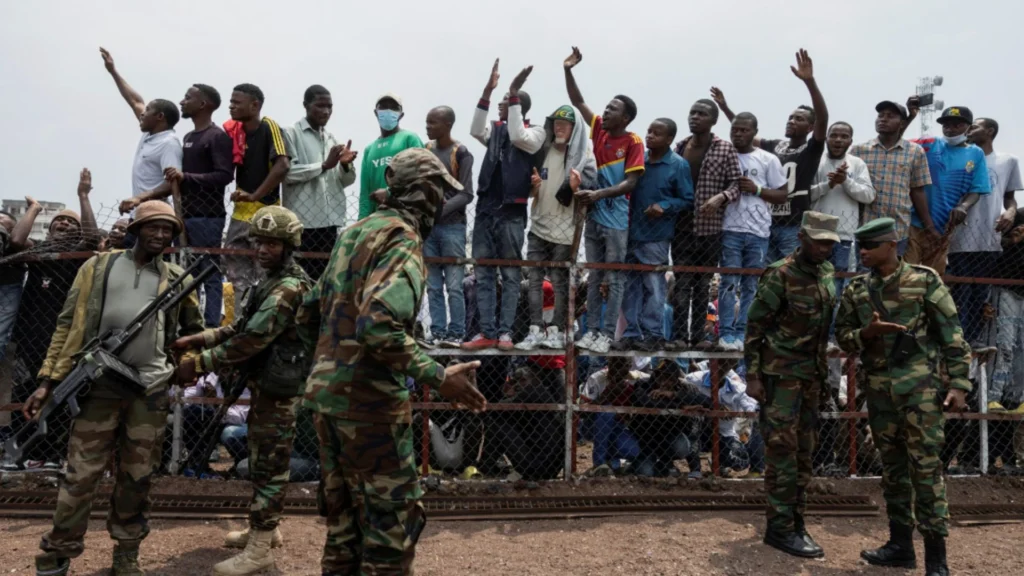- Looters have wiped out with an estimated 7,000 tonnes of critical humanitarian food supplies in Bukavu City.
- Bukavu, the second largest city in DRC fell to Rwanda-backed M23 rebels at the weekend just weeks after the militia took over Goma in the escalating conflict that worsened in January.
- According to aid organizations, the war in eastern DRC has caused a shortage of humanitarian routes and is now threatening the smooth delivery of essential services in the mineral-rich region.
Food aid in the Democratic Republic of Congo (DRC) took a devastating hit over the weekend, with 7,000 tonnes lost to looting, further deepening the crisis as M23 rebels escalate their attacks. The UN World Food Programme (WFP) has condemned the looting of thousands of tonnes of relief supplies in the city of Bukavu in the eastern DRC after Rwanda-backed M23 rebels swept in at the weekend, reportedly meeting little resistance
In an update on Monday, the WFP said that it “condemns the pillage of its warehouses in Bukavu in South Kivu…the food supplies kept there were meant to provide vital support to the most vulnerable families who now face a growing humanitarian crisis”.
7,000 tonnes of food aid stolen
In the statement, WFP said thousands of looters made off with an estimated 7,000 tonnes of humanitarian food supplies, adding that as violence spreads and access to food becomes increasingly difficult, “WFP stands ready to resume essential food aid to the most vulnerable as soon as it is safe to do so”.
The UN agency also urged all parties to the conflict “to respect their obligations vis-à-vis international humanitarian law”, which includes the protection of civilians and humanitarian workers.
The development came as M23 fighters made continuing gains in eastern DRC, after taking control of Goma – capital of North Kivu province – at the end of January. Hostilities have continued in this mineral-rich region for decades amid a proliferation of armed groups, forcing hundreds of thousands to flee their homes.
Aid routes blocked, agencies struggling to offer services
In an alert, the top UN aid official in the mineral-rich country, Bruno Lemarquis, warned last Thursday that a shortage of humanitarian routes was threatening the aid operation in the mineral-rich region. Strategic airports and key road networks are either not working or inaccessible due to the worsening security situation in the country.
Before the M23’s latest offensive at the beginning of the year, Mr. Lemarquis recalled that the humanitarian situation in South Kivu was already concerning. An estimated 1.65 million people, or just over 20 per cent of the province’s population, had been displaced for a wide range of reasons including war.
Speaking at the African Union headquarters on Saturday, the UN Secretary-General Antonio Guterres warned of the potential for the conflict to spark a regional war, before calling for “African diplomacy to solve the problem”.
Speaking on the sidelines of the African Union Summit, Guterres told journalists that it was “time to silence the guns, it’s time for diplomacy and dialogue. The sovereignty and territorial integrity of the DRC must be respected.”
MONUSCO, the international UN peacekeeping force in DRC, will continue to provide support, the UN chief continued, although he cautioned that “a peacekeeping force can’t solve the problem because there is no peace to keep”.
He insisted, on the other hand that the conflict “will be solved if there is an effective African unit and African diplomacy to solve the problem”.
Mr. Guterres pointed to the crucial importance of efforts such as the recently held joint summit by the South African Development Community in Tanzania, which resulted in a clear pathway for an immediate ceasefire.
Read also: M23 rebels: We will march all the way to Kinshasa











